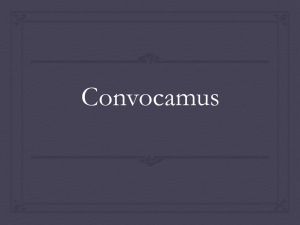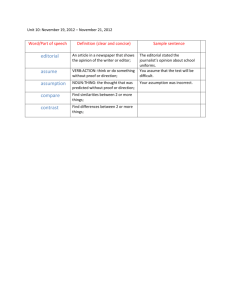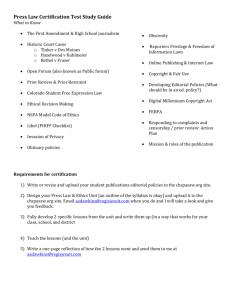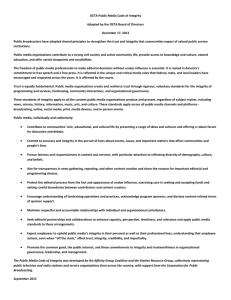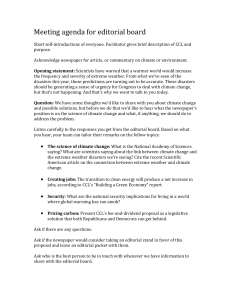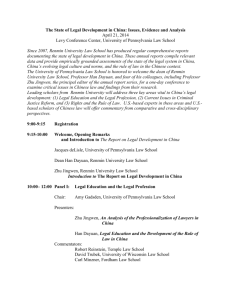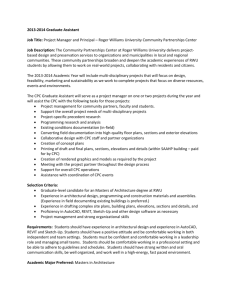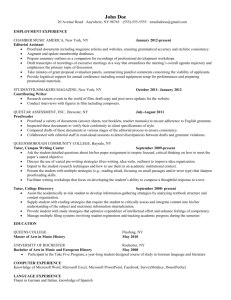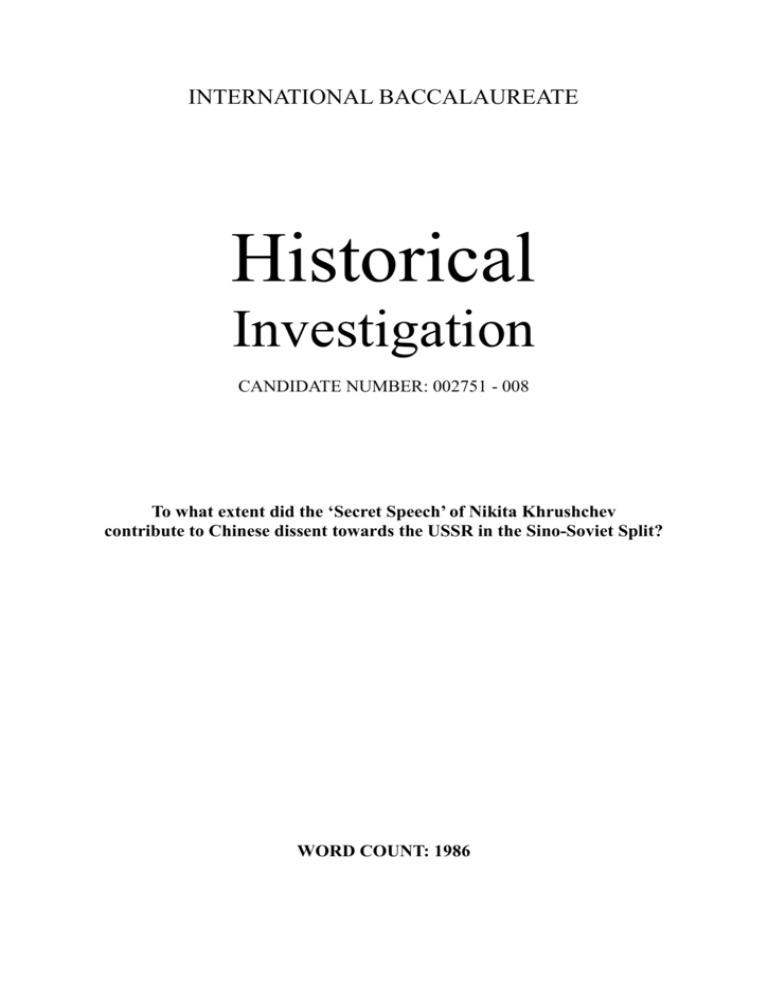
INTERNATIONAL BACCALAUREATE
Historical
Investigation
CANDIDATE NUMBER: 002751 - 008
To what extent did the ‘Secret Speech’ of Nikita Khrushchev
contribute to Chinese dissent towards the USSR in the Sino-Soviet Split?
WORD COUNT: 1986
CONTENTS
A.
PLAN OF THE INVESTIGATION…………………………………………………………3
B.
SUMMARY OF EVIDENCE………………………………………………………………..3
C.
EVALUATION OF SOURCES……………………………………………………………...5
D.
ANALYSIS…………………………………………………………………………………..6
E.
CONCLUSION……………………………………………………………………………...8
F.
LIST OF SOURCES…………………………………………………………………………..9
2
A. Plan of the Investigation
During the 20th Congress of the CPSU in 1956, Nikita Khrushchev addressed a speech denouncing Stalin and
Stalinism, prompting a negative response from the CPC and causing international commotion. After
publishing two initial appraisals of Khrushchev’s ‘Secret Speech’,1 the CPC published numerous letters and
articles that, after 1960, outspokenly disagreed with numerous policies of the USSR. 2 The aim of this
investigation is to assess whether the rift between the CPC and the CPSU originated from the ‘Secret Speech
‘of 1956. In order to investigate the motives behind the PRC’s dissent towards the Soviet Union, numerous
documents have been examined including Khrushchev’s ‘Secret Speech’, Chinese commentaries on the 20 th
Congress of the CPSU, and several third-party references. Two of these sources, Stalinism: It’s Origin and
Future by Andy Blunden and The Origin And Development Of The Differences Between The Leadership Of
The CPSU And Ourselves, by the Editorial Departments of Renmin Ribao, have been evaluated to establish
the role of Khrushchev’s ‘Secret Speech’ in Sino-Soviet affairs.
B. Summary of Evidence
THE MAIN THEMES OF KRUSHCHEV’S SECRET SPEECH
The ‘Secret Speech’ condemned Stalin’s actions, Stalinism, and the ‘cult of the individual’.3 Using numerous
examples, Khrushchev criticized Stalin for the formation of a personality cult and his purges and repressions.
In sections of the speech, Khrushchev made further comments on the path of socialist development. By
connecting instances of Stalinist rule with socioeconomic failures, Khrushchev discarded the legitimacy of
these methods in the development of socialism. 4 Finally, Khrushchev suggested a policy of peacefulcoexistence in foreign affairs.
CHINA’S RESPONSE TO THE 20th CONGRESS OF THE CPSU
When Khrushchev’s speech was given in 1956, the CPC was irritated by how they had not been pre-notified
of its advent. According to the leadership of the PRC, this displayed the CPSU’s carelessness for the interests
of ‘fraternal parties’.5 After 1960, the CPC further voiced its disagreement with the main issues of the 20th
Congress of the CPSU through a series of editorials published in Hongqi and Renmin Ribao.6 Eventually, the
CPC sent a letter to the CPSU on the 14th of June, 1963, which openly accused the Soviet Union of
These are two articles titled “On the Historical Experience of the Dictatorship of the Proletariat” and “More on the Historical
Experience of the Dictatorship of the Proletariat” that were originally published by Renmin Ribao (People’s Daily) on the 5th of April
1956, and the 29th of December, 1956, respectively.
2 "The Great Debate: Documents of the Sino-Soviet Split." Marxists Internet Archive. Web. 23 Jan. 2010-2011.
<http://www.marxists.org/history/international/comintern/sino-soviet-split/index.htm>.
3 Khrushchev, Nikita S. "On the Personality Cult and Its Consequences." The 20th Congress of the C.P.S.U. 24-25 Feb. 1956. Speech.
4 Khrushchev, Nikita S. "On the Personality Cult and Its Consequences." The 20th Congress of the C.P.S.U. 24-25 Feb. 1956. Speech.
5 The Editorial Departments of Renmin Ribao (People's Daily) and Hongqi (Red Flag). "The Origin And Development Of The
Differences Between The Leadership Of The CPSU And Ourselves." Editorial. Renmin Ribao and Hongqi [Peking] 6 Sept.
1963. Marxists Internet Archive. Web. Dec.-Jan. 2010-2011.
6 The newspapers Hongqi and Renmin Ribao are official organs of the Central Committee of the Chinese Communist Party.
1
3
revisionism from Marxist-Leninism.7 In response, the Central Committee of the CPSU published an equally
sharp ‘Open Letter’ that criticized the ideological direction of the CPC.8
Three main issues of conflict may be identified from the CPC’s evaluation of Khrushchev’s ‘Secret Speech’:
the ‘complete negation’ of Stalinism, the ‘peaceful transition to socialism’, and the proposal for peaceful
coexistence.9 On the issue of Stalin and Stalinism, the CPC argued that Khrushchev’s speech completely
undermined the great deeds of Stalin. These deeds outweighed the leader’s mistakes. By completely
incriminating Stalin and Stalinism, the CPSU was defaming the socialist system, the Soviet Union, and
creating division and disorder in the international communist movement. The idea of ‘peaceful transition’ was
said to be a perversion of Marxist-Leninism. The thesis of peaceful coexistence could only be an aid to
imperialism and great-power chauvinism.
CHINA’S POST-1949 DOMESTIC SITUATION
After the successful creation of the PRC in 1949, the CCP was faced with the extreme backwardness of
Chinese economy. Closely modeled on Stalin’s era of Soviet development, the Chinese began a series of
economic reforms including the First Five Year Plan and the Great Leap Forward. During these reforms, hardline ‘Stalinist’ methods were used in a class struggle against landlords.10 An estimated 2-3 million landlords
were ‘trialed’ and executed in this period.11 An additional 30 million citizens died from the famine caused by
the failure of the Great Leap Forward.12 Since the Great Leap Forward of 1958, Mao’s own ‘cult of
personality’ elevated rapidly to an extreme level. The massive purges following the ‘100 Flowers Campaign’
of 1957 also proved Mao’s adherence to a Stalinist use of force and terror. In comparison to the Soviet Union,
the CPC also lacked experience with the west and therefore felt more threatened by imperialism and the US.13
7
Central Committee of the Chinese Communist Party. "A Proposal Concerning the General Line of the International Communist
Movement." Letter to Central Committee of the Communist Party of the Soviet Union. 14 June 1963. Peking: Foreign Languages,
1963. Print.
8 Central Committee of the Communist Party of the Soviet Union. "The Polemic on the General Line of the International Communist
Movement." Editorial. Pravda [Moscow] 14 July 1963. Print.
9 The Editorial Departments of Renmin Ribao (People's Daily) and Hongqi (Red Flag). "The Origin And Development Of The
Differences Between The Leadership Of The CPSU And Ourselves." Editorial. Renmin Ribao and Hongqi [Peking] 6 Sept.
1963. Marxists Internet Archive. Web. Dec.-Jan. 2010-2011.
10 The landlords were classified as the rural elite of China and were considered to be class enemies.
11 Benson, Linda K. China since 1949. Harlow: Longman, 2002. Print.
12 Benson, Linda K. China since 1949. Harlow: Longman, 2002. Print.
13 Blunden, Andy. "The Sino-Soviet Split." Marxists Internet Archive. Web. 22 Jan. 2011.
<http://www.marxists.org/subject/stalinism/origins-future/ch3-1.htm>.
4
C. Evaluation of Sources
The Editorial Departments of Renmin Ribao (People's Daily) and Hongqi (Red Flag). "The Origin And
Development Of The Differences Between The Leadership Of The CPSU And Ourselves." Editorial. Renmin
Ribao and Hongqi [Peking] 6 Sept. 1963. Marxists Internet Archive. Web. Dec.-Jan. 2010-2011.
This editorial is a primary source written by the Editorial Departments of Renmin Ribao (People’s Daily) and
Hongqi (Red Flag), which were official organs of the Central Committee of the Chinese Communist Party.14
The article, first published on the 6th of September, 1963, by the Foreign Languages Press in ‘Peking’,15 was
subsequently transcribed onto the Marxists Internet Archive by the Maoist Documentation Project in 2005.
Through a point-by-point analysis of the ‘Open Letter’, this source outlines the main differences between the
CPC and the CPSU. Additionally, it discusses in detail the origins of the Sino-Soviet Split from the
perspective of the CPC. Most importantly, the article refers to numerous editorials and letters exchanged
between the CCP and the CPSU since Khrushchev’s ‘Secret Speech’ and analyzes their role in the Sino-Soviet
dispute. The source is evidently highly biased; the truth behind its arguments is questionable. However, its
value does not stem from the validity of its contents but from its proximity to the Sino-Soviet split. Thus, as a
primary source, the editorial is valuable to historians because it accurately portrays the CCP’s outward
rhetoric during the time of the incident. Nonetheless, its bias and origin are also limitations as the CCP would
have most likely masked their true thoughts and distorted reality in order to legitimize their actions.
Blunden, Andy. "The Sino-Soviet Split." Marxists Internet Archive. 1993. Dec.-Jan. 2010-2011
This article is a secondary source that was part of a collection of works called ‘Stalinism: Its Origins and
Future’ and was selected as it provided a detailed commentary on the Sino-Soviet Split. Blunden explores the
factors that contributed to Chinese dissent towards the ideas proposed during the 20 th Congress of the CPSU
and the subsequent changes in Soviet policies. The article evaluates the Sino-Soviet Split beyond the political
and ideological rhetoric that was exchanged between the CPC and the CPSU. As it was written in 1993, the
source provides a reasonably retrospective perspective on the Cold War and the Sino-Soviet Split. On the
other hand, since the article was written not long after the end of the Cold War, Blunden may still have been
subject to prejudices against the socialist states of China and the USSR. Its major limitations, therefore is the
subtle though noticeable bias towards the CPC. Additionally, the article lacks the use of primary sources. The
article’s main value lies in its consideration for the national, geo-political, and historical differences that
affected Chinese actions and responses towards the USSR.
“Renmin Ribao.” Encyclopædia Britannica Online. Encyclopædia Britannica, 2011. Web. 24 Jan. 2011.
<http://www.britannica.com/EBchecked/topic/498148/Renmin-Ribao>.
15 Beijing
14
5
D. Analysis
Nikita Khrushchev’s ‘Secret Speech’ may be described as the ‘spark’ for the deterioration of ties between the
CPSU and the CPC. Although the speech cannot be said to be the cause of the Sino-Soviet Split, it can be best
understood as the origin. By provoking a series of responses and counter-responses, the controversial ideas
created a chain reaction of editorials, articles, and letters. When evaluating these documents, it is noticeable
how subtle advice evolves into open and direct criticism between the two parties. From the CCP’s point of
view, ‘The 20th Congress of the CPSU was the first step along the road of revisionism taken by the leadership
of the CPSU’.16
There are numerous reasons to suggest that the worsening of relations between the CPC and CPSU originated
in 1956 with Khrushchev’s ‘Secret Speech’. Although outwardly the CPC questioned the ideological
correctness of this speech, their concerns had more to do with their own political legitimacy. As rightly said,
‘The questions raised by the leadership of the CPSU at the 20th Congress, and especially the question of Stalin
and of “peaceful transition”, [were] by no means simply internal affairs of the CPSU”.17 The discrediting of
Stalin meant the discrediting of the Stalinism in the CPC’s own domestic policies. The condemnation of the
‘cult of personality’ meant the damnation of Mao’s own personality cult. The promotion for ‘peaceful
transition’ contradicted Mao’s own advocate for ‘permanent revolution’.18
The ideas presented during the 20th Congress of the CPSU endangered the security and interests of the CPC.
As Blunden points out, “Mao was attempting to adopt the cloak of Stalin, just as Khrushchev was smearing
this cloak with mud”.19 The differences in the development of economy, political structure, and foreign
relations between the two parties became increasingly concrete after the speech in 1956, with neither party
being able to justify their own policies without denouncing the other’s. At the same time, the differences in
experience caused another area of disagreement between the two parties. Whereas the Soviet Union had
reached a stage where ideas such as ‘peaceful coexistence’ and ‘peaceful transition’ were more realistic, these
concepts were still alien to the fledgling Chinese state.20
Although unmentioned in their letters and editorials, CPC had a logical reason for defending Stalin and
disagreeing with the ‘Secret Speech’. The many aspects of Stalinism that Khrushchev denounced in his speech
16
The Editorial Departments of Renmin Ribao (People's Daily) and Hongqi (Red Flag). "The Origin And Development Of The
Differences Between The Leadership Of The CPSU And Ourselves." Editorial. Renmin Ribao and Hongqi [Peking] 6 Sept.
1963. Marxists Internet Archive. Web. Dec.-Jan. 2010-2011.
17 The Editorial Departments of Renmin Ribao (People's Daily) and Hongqi (Red Flag). "The Origin And Development Of The
Differences Between The Leadership Of The CPSU And Ourselves." Editorial. Renmin Ribao and Hongqi [Peking] 6 Sept.
1963. Marxists Internet Archive. Web. Dec.-Jan. 2010-2011.
18 Breslin, Shaun. Mao. Harlow, England: Longman, 1998. Print.
19 Blunden, Andy. "The Sino-Soviet Split." Marxists Internet Archive. Web. 22 Jan. 2011.
<http://www.marxists.org/subject/stalinism/origins-future/ch3-1.htm>.
20 Blunden, Andy. "The Sino-Soviet Split." Marxists Internet Archive. Web. 22 Jan. 2011.
<http://www.marxists.org/subject/stalinism/origins-future/ch3-1.htm>.
6
were policies being implemented in China. Mao’s own personality cult, for instance, was deliberately being
constructed through propaganda, education, and media. Breslin asserts, ‘The almost godlike status that Mao
held in China was the consequence of many years of ideological and propaganda work’.21 In economy, the
First Five Year Plan of 1953 borrowed heavily from the Soviet experience during its Stalinist era. The
influence of Stalinism and the Soviet Union in Chinese economical development can best be characterized by
China’s adherence to Lysenkoism.22 The horrific failure of the subsequent ‘Great Leap Forward’ further
necessitated Mao’s cult of personality and the justification of CPC’s domestic policies.23 Incidents such as the
heavy censorship and purges of ‘The Second Rectification’ after the ‘100 Flowers Campaign’ in 1957 also
indicated the bureaucracy of a Stalinist regime. Khrushchev’s ‘peaceful transition’ ideologically conflicted
with the frequent purges and repressions of Mao’s ‘permanent revolution’.24 Thus, Khrushchev’s speech not
only threatened to de-legitimize the CPC, possibly sparking counter-revolution, but also clashed with the
ideology of Maoism.
The CPC’s stance in world politics was also greatly influenced by their observations of the responses abroad.
Mao Zedong saw Khrushchev’s ‘peaceful coexistence’ and the abandonment of Stalinism as having
‘extremely serious consequences for the international communist movement’.25 In their editorials, the CPC
claim that the activities of ‘US imperialists’, ‘Titoites’, and ‘Trotskyites’ had been stirred to a frenzy, with
each eager to exploit the new weakness in the socialist movement.26 The uprisings in Poland and Hungary not
long after the USSR’s relinquishment of Stalinist methods further demonstrated the ‘serious consequences’ of
the ‘Secret Speech’. The ‘great ideological confusion in the international communist movement’ was
manifested in a worldwide split between socialist countries sympathetic to the Soviet Union and those
sympathetic to the CPC.27 Thus, the CPC rejected the ‘Secret Speech’ not only due to its threat to domestic
21
Breslin, Shaun. Mao. Harlow, England: Longman, 1998. Print.
False agronomic principles developed by quack scientist Trofim Lysenko. Lysenkoism was used in the Soviet Union before its
theories were proven false and discredited.
23 The Great Leap Forward was an economic movement in 1958, the failure of which resulted in the deaths of possibly 30 million
people.
24 Mao believed that class struggle must continue after the first revolution in order to continually cleanse society of bourgeois
elements. Violence and repression were necessary at a periodic basis in order to remain true to the initial revolution.
The Editorial Departments of Renmin Ribao (People's Daily) and Hongqi (Red Flag). "The Origin And Development Of The
Differences Between The Leadership Of The CPSU And Ourselves." Editorial. Renmin Ribao and Hongqi [Peking] 6 Sept.
1963. Marxists Internet Archive. Web. Dec.-Jan. 2010-2011.
25 The Editorial Departments of Renmin Ribao (People's Daily) and Hongqi (Red Flag). "The Origin And Development Of The
Differences Between The Leadership Of The CPSU And Ourselves." Editorial. Renmin Ribao and Hongqi [Peking] 6 Sept.
1963. Marxists Internet Archive. Web. Dec.-Jan. 2010-2011.
25 The Editorial Departments of Renmin Ribao (People's Daily) and Hongqi (Red Flag). "The Origin And Development Of The
Differences Between The Leadership Of The CPSU And Ourselves." Editorial. Renmin Ribao and Hongqi [Peking] 6 Sept.
1963. Marxists Internet Archive. Web. Dec.-Jan. 2010-2011.25 The Editorial Departments of Renmin Ribao (People's Daily) and
Hongqi (Red Flag). "The Origin And Development Of The Differences Between The Leadership Of The CPSU And Ourselves."
Editorial. Renmin Ribao and Hongqi [Peking] 6 Sept. 1963. Marxists Internet Archive. Web. Dec.-Jan. 2010-2011.
26 The Editorial Departments of Renmin Ribao (People's Daily) and Hongqi (Red Flag). "The Origin And Development Of The
Differences Between The Leadership Of The CPSU And Ourselves." Editorial. Renmin Ribao and Hongqi [Peking] 6 Sept.
1963. Marxists Internet Archive. Web. Dec.-Jan. 2010-2011.
27 The Editorial Departments of Renmin Ribao (People's Daily) and Hongqi (Red Flag). "The Origin And Development Of The
Differences Between The Leadership Of The CPSU And Ourselves." Editorial. Renmin Ribao and Hongqi [Peking] 6 Sept.
1963. Marxists Internet Archive. Web. Dec.-Jan. 2010-2011.
22
7
policy but also from observing foreign response to the 20th Congress of the CPSU.
E. Conclusion
To understand the significance of Nikita Khrushchev’s ‘Secret Speech’, several arguments have been detailed:
the political, ideological, and national reasons China may have had for its objection, and the immediate
consequences of the speech. The editorials and letters from the CPC indicate that there was an ideological
reason for their criticisms. The foreign reactions in Hungary, Poland, and Yugoslavia confirmed the Chinese
fears that Khrushchev was de-railing the legitimate road of socialism. Additionally, the CPC needed to
legitimize the policies of their own party since the Soviet Union had indirectly condemned China’s domestic
policies. The immediate consequences of the speech include the increasingly harsh rhetoric exchanged
between the CPSU and the CPC. Finally, as the CPC directly stated that the origins of the Sino-Soviet Split lie
in the 20th Congress of the CPSU, this provides further evidence for the key role Khrushchev’s speech played
in the CPC’s dissent. Consequently, the reason for the Sino-Soviet Split is evident not only in the CPC’s party
rhetoric but also in their historical and socioeconomic situation of the time.
8
F. List of Sources
Benson, Linda K. China since 1949. Harlow: Longman, 2002. Print.
Blunden, Andy. "The Sino-Soviet Split." Marxists Internet Archive. 1993. Web. Dec.-Jan. 2010-2011.
Breslin, Shaun. Mao. Harlow, England: Longman, 1998. Print.
Central Committee of the Communist Party of the Soviet Union. "The Polemic on the General Line of the
International Communist Movement." Editorial. Pravda [Moscow] 14 July 1963. Print.
Central Committee of the Chinese Communist Party. "A Proposal Concerning the General Line of the
International Communist Movement." Letter to Central Committee of the Communist Party of the Soviet
Union. 14 June 1963. Peking: Foreign Languages, 1963. Print.
Khrushchev, Nikita S. "On the Personality Cult and Its Consequences." The 20th Congress of the C.P.S.U. 2425 Feb. 1956. Speech.
Mackerras, Colin. China in Transformation 1900-1949 / Colin Mackerras. 2nd ed. Harlow, England:
Pearson/Longman, 2008. Print.
McCauley, Martin. The Origins of the Cold War 1941-1949. 3rd ed. Harlow, England: Pearson Longman,
2008. Print.
"Pravda." Encyclopædia Britannica. Encyclopædia Britannica Online. Encyclopædia Britannica, 2011. Web.
30 Jan. 2011. <http://www.britannica.com/EBchecked/topic/474092/Pravda>.
"Renmin Ribao." Encyclopædia Britannica. Encyclopædia Britannica Online. Encyclopædia Britannica, 2011.
Web. 30 Jan. 2011. <http://www.britannica.com/EBchecked/topic/498148/Renmin-Ribao>.
Thompson, John M. A Vision Unfulfilled: Russia and the Soviet Union in the Twentieth Century. Lexington,
Mass. [u.a.: Heath, 1996. Print.
The Editorial Department of 'Renmin Ribao' "On the Historical Experience of the Dictatorship of the
Proletariat." Editorial. Renmin Ribao [Peking] 5 Apr. 1956. Marxists Internet Archive. Web. Dec.-Jan. 20102011.
The Editorial Department of 'Renmin Ribao' "More On the Historical Experience of the Dictatorship of the
Proletariat." Editorial. Renmin Ribao [Peking] 29 Dec. 1956. Marxists Internet Archive. Web. Dec.-Jan. 20102011.
9
The Editorial Departments of Renmin Ribao (People's Daily) and Hongqi (Red Flag). "The Origin And
Development Of The Differences Between The Leadership Of The CPSU And Ourselves." Editorial. Renmin
Ribao and Hongqi [Peking] 6 Sept. 1963. Marxists Internet Archive. Web. Dec.-Jan. 2010-2011.
Tomkinson, John L. Single Party States. 3rd ed. Athens, Greece: Anagnosis, 2007. Print.
Tomkinson, John L. The Cold War. 2nd ed. Athens, Greece: Anagnosis, 2006. Print.
10

